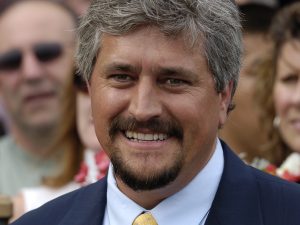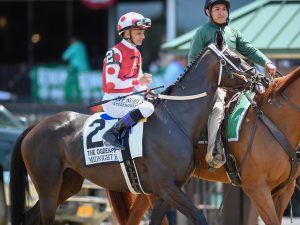By Richard Rosenblatt

Steve Asmussen – Photo by Adam Coglianese, NYRA
The revelation for trainer Steve Asmussen came 11 years ago in California, just after his soon-to-be two-time Horse of the Year Curlin finished fourth in the Breeders’ Cup Classic at Santa Anita Park.
Horse of the Year in 2007 with a trio of Grade 1 wins in the Preakness, Jockey Club Gold Cup and Breeders’ Cup Classic, the mighty Curlin returned at age 4 and won a handicap race in Dubai before overpowering the field in the $6 million Dubai World Cup (G1), at the time the richest race in the world. After his return to the United States, Asmussen watched in awe as Curlin went on to win the Stephen Foster (G1), run second in the Man o’ War (G1), and win the Woodward (G1) and Jockey Club Gold Cup before he was able to take a deep dive into the nature of the top-level horses he’s trained over the years.
“As blessed as we’ve been (with the horses he’s trained), my biggest Aha! moment came after Curlin got beat in the Classic,’’ said the Hall of Fame trainer as he sat in the office at his barn at Saratoga Race Course, preparing his latest star, Midnight Bisou, for Saturday’s $700,000 Personal Ensign (G1) on Travers Day.
“Their understanding far exceeds what you are thinking. I remember having an overwhelming feeling of gratitude and he looked right through me (as if to say) ‘It’s never you, it’s always me, you fool,’” he recalled. “It’s at a level so unique, so special, it’s indescribable. It’s just strong. Just so strong.”
Great horses can have a humbling effect on the humans around them. Ask Bob Baffert about American Pharoah, John Shireffs about Zenyatta, and yes, Asmussen about Rachel Alexandra, who he trained at age 3 to beat the boys in the Preakness, the Haskell and the Woodward, and was chosen Horse of the Year.
Asmussen is among the nation’s leading trainers over the past 20 years and winner of two Eclipse Awards. He shuns the spotlight and can be downright churlish if he’s not in the mood to do an interview, but there are other times when he’s happy to open up. He’s also had a number of medication violations and was suspended several times during his career after horses in his care tested positive for prohibited drugs.
Currently, he’s second behind Chad Brown in trainer earnings with $16.5 million, and he’s got himself another standout filly in Midnight Bisou – a four-time Grade 1 winner who is 5-for-5 this year.
“She’s an amazingly consistent mare that has maintained a very high level for an extended period of time,’’ said Asmussen. “We’re expecting and want more of the same.”
Hall of Fame rider Mike Smith will again be aboard Midnight Bisou, and Asmussen says the team is working on a high — almost mystical — level.
“Her talent goes without question, but she’s obviously very intelligent,” he said. “Her relationship with Mike, you can see the evolution of it, where they’re at now and how responsive she is to him. You get into some of these older races, and the number of horses in them has so much to do with how the race shapes up. She and Mike have been making beautiful adjustments, regardless of who she is in with, for where she needs to be in a race.”
Smith, who has ridden some of racing greatest fillies and mares — Zenyatta, Songbird, Royal Delta to name a few — agrees that he and Midnight Bisou hit it off from the start.

Midnight Bisou
“It’s like people. Sometimes you just seem to hit it off from the beginning,’’ said Smith. “I seem to know what she likes and doesn’t like and I know her body language. I continue to try to put her in a place where she’s happy. She’s running better and better and has developed into a nice mare. She’ll do anything you want, she’s so push-button.”
On Saturday, Midnight Bisou will face five rivals in the Personal Ensign, one of six Grade 1’s on the Travers card anchored by the 150th edition of the Mid-Summer Derby, with Tacitus the 5-2 morning-line favorite.
Midnight Bisou, though, could steal the show with another impressive performance. While Asmussen is effusive in his praise of the daughter of Midnight Lute, he believes Smith has played an important role in her ability to adjust to any situations that may develop during a race.
“She gave herself a lot do off the bench in Houston Ladies Classic (G3),’’ said Asmussen of a race in which Midnight Bisou had to close with a rush to win in her first start of the year. “Since then she has been very sharp. Some of (her adjustments] are very subtle within the individual races. It’s almost like Mike will think, ‘I want to be there,’ and she gets there without a lot of obvious visual adjustment. Those are the things you really admire, especially at this level.
“In several of Bisou’s races, the racetrack didn’t seem to be playing to her natural style, but she somehow put herself right where you needed to be on that day.”
Midnight Bisou has never been worse than third in her 16-race career, with 10 wins, three seconds and three thirds for earnings of $2,870,000. Her last four wins came in the Azeri (G2) and Apple Blossom Handicap (G1), both at Oaklawn Park, the Ogden Phipps (G1) at Belmont and the Molly Pitcher (G3) at Monmouth Park on July 20.
Heading into the Personal Ensign, Midnight Bisou ranks fourth in the NTRA’s most recent Top 10 thoroughbred poll.
“I’m just glad to be part of it,’’ said Asmussen. “It’s really special.”

Over the years while working at The Associated Press, Rich Rosenblatt became a familiar name to legions of the horse racing fans and industry insiders with his award-winning articles on horse racing and his stories from the backstretch.
In addition to being an astute observer of sports, Rosenblatt is the co-author of The All-American Chili Cookbook. His work has been seen in just about every publication in the world, including The New York Times, The Washington Post and Time Magazine.


